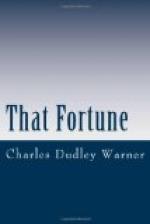But later on, when Celia had got into the swing of the classics, and was training for a part in the play of “Antigone,” she wrote in a different strain, though she would have denied that the change had any relation to the fact that she had strained her back in a rowing-match. She did not apologize for her former advice, but she was all aglow about the Greek drama, and made reference to Aspasia as an intellectual type of what women might become. “I didn’t ever tell you how envious I used to be when you were studying Greek with that old codger in Rivervale, and could talk about Athens and all that. Next time we meet, I can tell you, it will be Greek meets Greek. I do hope you have not dropped the classics and gone in for the modern notion of being real and practical. If I ever hear of your writing ‘real’ poetry—it is supposed to be real if it is in dialect or misspelled! never will write you again, much less speak to you.”
Whatever this decided young woman was doing at the time she was sure was the best for everybody to do, and especially for Master Phil.
Now that the days of preparation were over, and Philip found himself in New York, face to face with the fact that he had nowhere to look for money to meet the expense of rent, board, and clothes except to his own daily labor, and that there was another economy besides that which he had practiced as to luxuries, there were doubtless hours when his faith wavered a little in the wisdom of the decision that had invested all his patrimony in himself. He had been fortunate, to be sure, in securing a clerk’s desk in the great law-office of Hunt, Sharp & Tweedle, and he had the kindly encouragement of the firm that, with close application to business, he would make his way. But even in this he had his misgivings, for a great part of his acquirements, and those he most valued, did not seem to be of any use in his office-work. He had a lofty conception of his chosen profession, as the right arm in the administration of justice between man and man. In practice, however, it seemed to him that the object was to win a case rather than to do justice in a case. Unfortunately, also, he had cultivated his imagination to the extent that he could see both sides of a case. To see both sides is indeed the requisite of a great lawyer, but to see the opposite side only in order to win, as in looking over an opponent’s hand in a game of cards. It seemed to Philip that this clear perception would paralyze his efforts for one side if he knew it was the wrong side. The argument was that every cause a man’s claim or his defense—ought to be presented in its fullness and urged with all the advocate’s ingenuity, and that the decision was in the bosom of an immaculate justice on the bench and the unbiased intelligence in the jury-box. This might be so. But Philip wondered what would be the effect on his own character and on his intellect if he indulged much in the habit of making the worse




